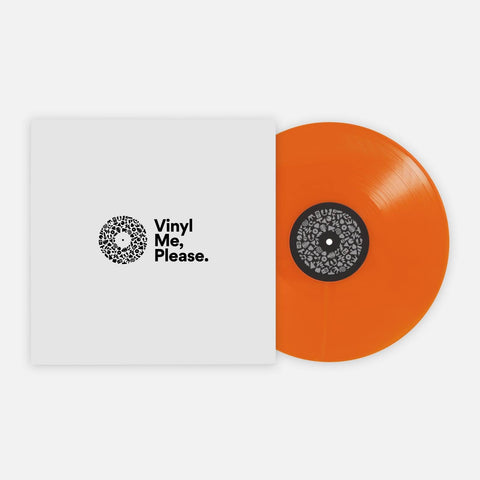Wagon Christ's Musipal: A Landmark Record In Electronic Music History
This month, we're excited to be featuring a limited edition of Wagon Christ's Musipal. It's not necessarily a well known record, so we had Gary Suarez, our electronic columnist--his Digital/Divide drops at the end of every month--write about why the album is important, and place it in the lineage of electronic music that came before and since.
For close to three decades, Luke Vibert has been shapeshifting through the electronic music multiverse. Much like his Cornish contemporaries Richard D. James and Tom Middleton, the prolific producer embraced the use of pseudonyms in the promulgation of his music, allowing him to show off the many facets of his sound while transitioning from the Ace Of Clubs to Amen Andrews to Kerrier District and so on. Caught up in Trent Reznor’s tastemaking cavalcade in the latter half of the 1990s alongside Autechre, Meat Beat Manifesto, Plaid, and Squarepusher, his subdued drum n’ bass project Plug reached American audiences through a stateside release on Nothing Records.
To this day, the best known of Vibert’s endeavors remains Wagon Christ. Though earlier works under that name for London-based Rising High Records skewed more towards ambient electronica, 2001’s Musipal encapsulated Vibert’s whimsical, anarchic vision, an attempted coup d’etat of the then-burgeoning downtempo sound invading overpriced lounges, pricey hotel bars, and chic boutiques.
At the time of the album’s release, the Ninja Tune record label had firmly established itself as the hippest interpretation of this genre’s bloom. Artists like Amon Tobin, Mr. Scruff, and DJ Food earned high marks and credibility for their sampladelic productions there. The label’s penchant for the converting of unfashionable sounds into modern tracks provided an essential soundtrack for those seeking for a subdued alternative to clubby thumps or at least a respite from them during the pregame or afterhours.
Yet Musipal proved a cut above this peer group, thanks in no small part to Vibert’s uncanny knack for the practically magical lead-to-gold transmutation of uncool into cool. The overt playfulness of the material and its comparatively subtler hip-hop undertones made for a musical conglomerate of movie monster proportions, a frolicsome thrashing that took downtempo to a near cartoonish extreme. (At times, like on the woozy funk of “Cris Chana,” one expects Porky Pig to burst from the speaker to blurt and stutter “That’s all, folks!”)
Repetition plays a vital structural role throughout Musipal, particularly on the vocal and speech samples. Opener “The Premise” seems almost a parody of what the Avalanches did with 2000’s Since I Left You, cycling and recycling through a parade of unrelated voices in a pseudo-attempt to define this loose record. The exploitation flick urgency of “Receiver” depends on the telephone operator’s incessant, inadvertent hook. If any through line in Vibert’s robust discography exists, acid is the common denominator.
One can hear the 303’s low churn on “Tommorow Acid,” but even that is subverted here in the service of something grander than gear worship. With traces and winking references to any number of influences, Musipal plumbs exotica, lounge, and soul and affixes it to sharp breaks. Marimba jam “Boney L” slips an old Tom And Jerry line into the martini mix. Immersed in amusing animal noises, “Perkission” swings with pluck and precision, while “Thick Stew” doles out thunderous jazz drums to play out against a familiar melody.
Few artists could handle the immense potency that Musipal bears. Fortunately, two factors prevent the album from succumbing to its veritable kitsch miasma the way a lesser work assuredly would. First of these is Vibert’s genuine appreciation for the oft-underappreciated sounds he so clearly mined to make the album. Also evidenced by his subsequent Nuggets compilation series of archival electronic recordings, his love for music spans genres and decades.
Secondly, Musipal is a surreptitious hip-hop classic, an odd yet accessible release that by all rights should be hailed alongside the works of beat misfits like J Dilla and Madlib. The boom bap of the title track may not hit as hard as some of the classics, but the spirit of the genre’s golden age remains nonetheless. Referencing his rap aficionado background, Vibert builds a tower of distortion and noise atop the structural integrity of “It Is Always Now, All Over Now.” Elsewhere, he delivers a head-nodding good time for “Step To The Music.”
More than a decade and a half since its initial release, Musipal feels singular in both intent and execution. Coming off the highs of the turn-of-the-century big beat sound, Wagon Christ’s cheeky turn could have been interpreted as some sort of Fatboy Slim wannabe, another goofy Brit having a go at the world. Instead, it became Vibert’s touchstone and a landmark record in electronic music history. No matter what entry point a motivated listener takes into this sensational record, they are bound to discover its wonders.
Born, raised and still living in New York City, Gary Suarez writes about music and culture for a variety of publications. Since 1999, his work has appeared in various outlets including Forbes, High Times, Rolling Stone, Vice and Vulture, among others. In 2020, he founded the independent hip-hop newsletter and podcast, Cabbages.
Join the Club!
Join Now, Starting at $36Pages




